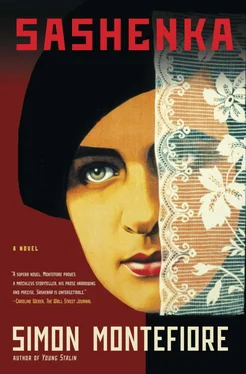At small tables, a single old man in a black fedora read in the half light; a group of American backpackers in yellow Timberlands and big shorts with their wallets on belts round their waists (advertising their Western riches to any brigands present) toasted one another in Georgian wine; and two grey-haired Georgians argued loudly about their politicians.
“Shevardnadze’s a traitor, a spy, KGB!” shouted one.
“Zviad’s a lunatic, a spy, KGB!” retorted the other.
“Do you want a table? Wine? Dinner?” asked a tall slim Georgian man with a blue beret on his head and a chokha coat, wasp-waisted with pouches for bullets, and a jeweled dagger in his belt. He bowed. “I’m Nugzar. Who are you? You look lost.”
“Do you know Audrey Zeitlin? I want to see her.”
“The old English lady? She’s our icon, our lucky charm! We feed her every day. She worked here for a long time, she taught us English and our children! Upstairs, come on!”
Katinka followed Nugzar to the first floor, along a corridor where the vine had punched its way through the wall and joined up with another of its limbs through a window that could no longer be closed. He knocked on the door at the end.
“Anuko!” he called.
Those Georgians, Katinka thought, with their funny diminutives!
“A visitor, Anuko!”
No reply.
Peering tentatively into the gloom, Nugzar opened the door.
“I always hoped you would come,” said Lala in the squeezed pitch of the ancient.
She wore a housecoat over a nightgown, and had long white hair. There was little left of her, just a bag of bones held together by white skin so delicate one could almost see through it. But it was her eyes, which seemed enormous in their glowing opalescence, that drew in Katinka, for they had a bold, exuberant will that held the spotlight and challenged the energy of the young. “I’ve waited for fifty years. What took you so long?”
“Hello,” Katinka said hesitantly, afraid she had come to the wrong place, yet surprised that this antique woman seemed to know who she was. “Marshal Satinov sent me to see you.”
“Ah—Satinov. He was our hero, our guardian angel. He’s old now, of course. Not as old as me, though. Sit down, sit down.”
Katinka sat in the soft chair in the corner of the small room musty with tissues and hand cream. There was a single candle beside the bed; sepia photographs of grandees in stiff white collars and bowler hats; a haughty schoolgirl in a white pinafore; a silver model of an oil derrick; and many old books.
“Here, girl, puff up my pillow behind me, and bring me a glass of wine. Ask Nugzar downstairs. Then we must talk. All night. You don’t sleep much when you’re as old as me. Who wants to be alive at my age? It’s miserable. All my friends are dead and that’s no fun! My husband’s been dead for forty years. But I think I’ve been waiting. I’ve been waiting for you, darling child. And now you’re here, sent by Marshal Satinov. He wants you to find my lost children, doesn’t he? Are you taking notes, dear?”
Feeling as though she had stepped into a dream, Katinka dug into her bag for her notebook and pen.
“I’m going to tell you about Sashenka, Snowy and Carlo.”
“Wait, I know Sashenka but who’s Snowy and…”
“Don’t you know anything, girl? Snowy and Carlo were Sashenka’s children. Their real names were Volya and Karlmarx. I’m going to tell you their story but first, open the window, will you?” Katinka was only too glad to let in the fragrant air. The dreamy garden seethed outside. The scent of violets, roses and that almondish, appleish tkemali blossom slowly penetrated the stuffy room in waves through the slats of the old-fashioned shutters. From the rooms below, the kitchen cauldrons in which chakapuli was boiling released powerful aromas of ginger and nutmeg.
And so it was that, as she drank her wine and ate slices of khachapuri brought up by the Georgian warrior from the café, Katinka traveled back in time to an unimaginable epoch in a house on Greater Maritime Street in St. Petersburg, where a rich Jewish banker and his flighty wife brought up a daughter named Sashenka with the help of a young English nanny whose parents had run the Live and Let Live public house in a village named Pegsdon, not far from the market town of Hitchin, Hertfordshire. “Lala” Lewis, as Sashenka had once called her, “and you must call me that too, Katinka,” seemed to know everything about the Zeitlin family. She described the solemn gawky child, bullied and disdained by her mother, loved distantly by her father, nourished by the devotion of her nanny.
What a picture Lala Lewis painted of those times: of cars with split windshields, chrome lights, leather and teak upholstery, carriages and sledges with postilions in top hats and sheepskins; millionaires, counts and revolutionaries, uncles and chauffeurs, breakdowns and suicides.
“I fell in love with Baron Zeitlin right here in this Tbilisi house—it had belonged to him, long, long ago,” Lala told Katinka, and that later he’d asked her to marry him in a kabinet at a smart restaurant, the Donan in St. Petersburg.
“Samuil lost everything in 1917, but he rebuilt his career in the Soviet service then lost it all again in 1929, and we returned here. We thought it would be safer. We felt that we didn’t have long so we didn’t waste a moment,” she said. “We so loved each other. Every day was a honeymoon, every kiss was a bonus, a gift. In Moscow, Sashenka and Vanya—as everyone called her husband—were bosses. They knew everyone, even Stalin—Sashenka was a magazine editor and Vanya a secret policeman, probably a terrible butcher, although he seemed a jovial fellow. We longed to see them—I loved Sashenka as much as Samuil did. It was our love of Sashenka that first brought us together, you know. When the NKVD took Samuil away, I knew he was doomed, and I waited for them to take me too. I kept working here in the café; I taught English; I looked after children; I became the best English teacher in the town. I taught the bosses’ children and I still do a little teaching today! But I’m getting ahead of myself. When they took Samuil, I grieved for him. The mail and money I sent him was returned: that meant he was dead. Then they took Sashenka and Vanya too. I despaired then. So imagine my amazement when Samuil came back. Oh, the randomness of death in those times!”
“How did Samuil take Sashenka’s disappearance?”
“When Samuil was sinking in and out of coma on his deathbed, he said, ‘Sashenka darling, my lisichka , my little fox, will you kiss me, Sashenka, before I die?’ He was sure Sashenka would come back. So I promised that I’d wait for her instead.”
“Are you tired, Lala?” asked Katinka, anxious about Lala’s strength yet greedy for her stories. “Do you want to sleep for a bit?” She noticed tears seeping down the old lady’s cheeks.
“I’m tired but I’ve waited so long to tell this. You see, when Samuil was in the camps, Comrade Satinov called me to the Viceroy’s Palace with a proposal that I could not refuse. Listen to me, Katinka. I only have the strength to tell this once.”
“I’m listening, I promise!”
“Hercules Satinov was a hero. He had a young wife and new baby and all the privileges of his rank. He could have been shot for helping Sashenka’s children but he fixed everything. When everyone else was a lackey, a coward and a killer, he alone dared to be decent. If you write this story, write that!”
“I will,” said Katinka, remembering the sly old marshal and his expression of pain when she asked him about Sashenka and her children.
“At the Viceroy’s Palace—it was then the Communist headquarters—Satinov told me that something terrible had happened to Sashenka and Vanya, and I needed to care for their children. He told me to go to Rostov Station, where I found the children and their nanny, Carolina, in the canteen. They were exhausted, hungry and filthy, but I loved them instantly. It was as if I’d raised them myself because Sashenka had cared for them just like I’d cared for her. Snowy so reminded me of Sashenka that I kissed her the moment I saw her and she melted into my arms! Carlo was adorable, bold and playful—like his father but with Samuil’s eyes and smile, even his dimple. They immediately trusted me, who knows why—perhaps they sensed a connection to their mama. Oh, it was heartbreaking! First they were parted from father, then mother, then Carolina: she was like a mother to them herself. I left the hotel in Rostov when she was still asleep—I still feel guilty about that—but I hope she understood because she too had risked her life for those children.”
Читать дальше












